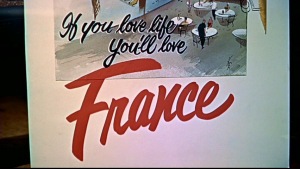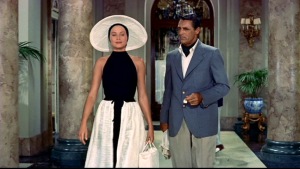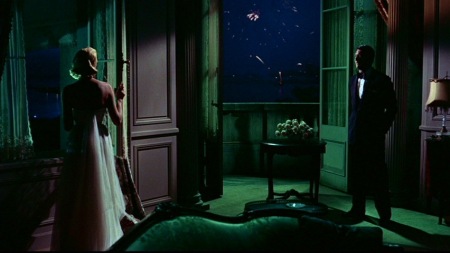 If you have enjoyed this image, may I recommend Chickens in the Movies by Jon Stephen Fink.
If you have enjoyed this image, may I recommend Chickens in the Movies by Jon Stephen Fink.
TO CATCH A THIEF is, at times, more than lightly likable. Hitch was on a roll, and if this movie sets him fewer technical and conceptual challenges than his most ambitious works, it nevertheless shows him at such a peak of skill that he and his team can’t go five minutes without achieving a beautiful effect.
Hitch had bought David Dodge’s book for Transatlantic — I wrote here of a precursor to the story — to make as an independent movie, but finally made it as part of his Paramount deal. Cary Grant, a one-time acrobat himself, must have been the first and only choice to play John Robie, acrobat turned cat-burglar turned resistance fighter, now very comfortably retired. And Grace Kelly to play opposite him, naturally.
Fiona hadn’t seen this one in a while, so we watched together. Just as we were enjoying the way the opening titles slant off on the diagonal, following the angle of the shop window, Hitch pulls a fast one, tracking in on the tourist slogan — and we well remember those Cote d’Azur landscapes, so the gesture seems quite unironic — and then he cuts to a screaming woman slathered in expensive face cream, and thence to the subject of her distress, an empty jewelry case — and we’re OFF.

 Fiona couldn’t stop laughing at this Eisensteinian joke for at least a minute afterwards.
Fiona couldn’t stop laughing at this Eisensteinian joke for at least a minute afterwards.
Cary Grant, who’s brown as a nut, which makes sense given his choice of retirement home, but is perhaps a bit extreme for Technicolor to cope with in night scenes, is scarcely required to perform any activity more athletic than pouring a brandy, but convinces us of his gymnastic prowess just by the way he crosses a room, Cary Grant, I say, pulls a fast one and eludes the police in a cross-country chase (filmed by helicopter, still a fresh and surprising approach at the time) actually performed by his housekeeper — in the first of a few trick substitutions in John Michael Hayes’ script — Cary Grant, I say again, is rather wonderful here. The plot requires him to catch the real jewel thief plaguing the South of France, in order to avoid arrest himself, which is excuse enough for some light comedy and glamour. It’s odd that any excuse at all should be needed, but somehow it is.
 The caged bird on the bus recalls those love birds leaning into the curves as Tippi speeds along in THE BIRDS… but that’s later. Cary seems to almost notice his director…
The caged bird on the bus recalls those love birds leaning into the curves as Tippi speeds along in THE BIRDS… but that’s later. Cary seems to almost notice his director…
Shoring up the comedy is John Williams, sometimes cited as the actor who worked for Hitchcock more than anyone else, although I really must do the math sometime and compare him to John Longden or one of the other forgotten British players from the early days, and then Jessie Royce Landis and Grace Kelly, but first there’s the slight hiccup of the French contingent.

I have no problem with Brigit Auber, whose French accent is just thick enough to be cute — any thicker and we’d be struggling to maker her out and she’d be struggling to act through it. Her gamine look is tres charmant, although that hairdo only looks really good when she’s wet, as Fiona pointed out. The rest of the time it has an unfortunate air of the tonsure. I wonder Hitchcock didn’t snap up Bardot, but Auber, fresh from Duvivier’s SOUS LE CIEL DE PARIS, is very good. But poor Charles Vanel couldn’t speak English to save his life, so apart from the pleasing Clouzot connection (he made LES DIABOLIQUES the same year), he kind of wrecks his bits. A more dynamic physical presence might have helped too, to serve as a convincing suspect for the Cat. Another odd thing — when Vanel speaks French, he uses his own voice, which means both his timbre and acoustics change whenever he shifts to English.

It’s the Cary Grant – Grace Kelly chemistry that carries this one, and if you’re immune then the movie will certainly have its longeurs. Hayes writes terrific chat, but sees no reason to have his characters shut up, so the talk goes on a bit. The carnival chase Hitch sliced from the story to save the budget is a loss that’s somewhat missed, I feel. Instead we get what seems like ten minutes of Cary Grant and John Williams discussing the plot over quiche lorraine — a dish which has rather lost its aura of exotic romance, I fear.
But some of the dialogue is very good indeed, especially in the celebrated picnic scene. Grace, having stolen a kiss from Cary at her hotel room door (Fiona reckons this was probably Grace’s real-life technique: pounce, but with class), and helped him escape the police in a high-speed chase along winding mountain roads (basically rehearsing her own death, you can’t help but feel) in a fake car that swivels back and forth as the rear-projected scenery unspools behind them, has now rumbled that he’s Robie the Cat and not Mr Burns, the Oregon logger (Grant: “I must remember to yell ‘Timber!’ occasionally.”) and they spar stylishly over chicken legs in what’s largely a single take, interrupted only by the closer view for the embrace at the end.

I’d like to lay to rest the idea that the actors improvised this scene — Hitchcock seems to have put this about, explaining that he was so relaxed on the Riviera with familiar actors, that he allowed them to go off the script, contrary to his usual practice. Well, the scene looks to me like a studio insert, for one thing, and for another, the dialogue is extremely tight. I like improvisation as much as the next man, as long as the next man isn’t actually John Cassavetes, but generally it needs to be edited down, and that clearly hasn’t happened here. And we know from elsewhere in Grant’s career that he’s a rather brilliant improv comic, but I still harbour grave doubts that he could pull this one off. And I’m even less inclined to believe Grace could. I think the reason they’re both excellent in this scene is that they have a very fine, very precise script to work off, and that they may have added the odd line, but scarcely enough to make a fuss about, except that it’s Hitchcock and so that’s unusual.
I very much fear that the improvisation story was put about by Hitch to downplay Hayes’ contribution. Hayes would begin to think of himself as an essential part of the team, and reported that when Variety referred to “the next Hitchcock-Hayes project” Hitch couldn’t stand it, and broke off their successful collaboration.
Still, we can all agree it’s a fun scene. Along with the catty battle in the sea at Cannes, it looks like the most fun Cary’s had in a Hitchcock film since the light comedy opening of SUSPICION.

The big love scene — again using the emerald green light he’s used to signify nights when the Cat is about (movie nights are usually blue, but moonlight is colourless, so green seems just as good a choice) — Hitch intercuts Hayes’s racy dialogue with a fireworks display erupting into orgasm. This displeased the censors, so Hitch placated them by toning down Lyn Murray’s score (Murray would introduce Hitchcock to Bernard Herrmann, thereby making an immeasurable contribution to cinema, and doing himself out of a job, although as a busy TV composer he scored thirty episodes of The Alfred Hitchcock Hour, including I Saw the Whole Thing, the only episode directed by Hitch). The use of colour, lighting (with Grace’s head fading into shadow, the better to illuminate her jewels and decolletage), special effects, music, dialogue and performance, and that green glow, makes this almost a precursor to VERTIGO’s famous hotel-room tryst, although the emotions are not nearly as dark and complex. If you simply say “fireworks-orgasm,” it sounds a bit silly, but it’s sublime.
And then Jessie’s jewels are stolen and Grace goes off Cary — not for being a thief, but for sleeping with her and betraying her. It’s the closest the film gets to actual emotional darkness, but Hitch and Hayes play it for laughs. Incidentally, I had to keep reminding myself that Grace is supposed to be a spoiled heiress with emotional problems. Her eagerness to join Cary in his supposed career as international mystery burglar is pretty reprehensible, I guess, but she’s so charming and self-possessed, I couldn’t see her as a brat. Fiona thought she was delightful too. Fiona has quite a male brain in some respects (she had it measured once, her brain’s maleness, I mean) so she could totally see the appeal: rich, classy, elegant, beautiful, funny and an easy lay. Aspirations to a life of banditry are easy to overlook when you have all that going for you.
Hayes, a wizard with the verbiage, admitted to being less strong on construction, and it’s possible there’s a flaw in this one. After the one-legged waiter gets offed by cops — the only killing in the film — Cary is exonerated, which effectively lets him out of the story altogether, if he wants. Only a desire for the truth keeps him around. According to the “rules” of classical screenwriting, this is exactly what one doesn’t want to happen. At the second act curtain, the protag and anatag are, strictly speaking, supposed to be locked into their oppositional courses, with no way out possible. This primes the audience to expect an exciting climax in which stuff will get settled, once and for all. Here, the tension is lifted considerably, since Cary is no longer a wanted man, just when it should be intensified. But the effects of Hayes’ violating this gimmick are somewhat interesting.
If we see the film as a romantic comedy, the situation is more tense than if it were a thriller. Cary falls out with both leading ladies, and Hitch switches the focus to Grace Kelly’s character more overtly than he has done so far. The fact that Grant no longer needs to solve the case means he also no longer needs to hang out with the hot rich girl (such demands Hitch places upon his leading men!) and so the love story could end badly. The second benefit Hitch gets from lifting the cops’ suspicions off Cary is that at the end, when he’s picked out by a spotlight on the roof of the villa, he’s suddenly the prime suspect again and his jeopardy is intensified by being a sudden and extreme worsening of the situation.
This sequence, in the aftermath of a fancy dress ball, is not the only thing that makes me think that the movie directly inspired THE PINK PANTHER. The whole plot motor is essentially the same, with a famous and glamorous cat burglar whose inimitable style is copied by an impostor. So Hitchcock has a lot to answer for. If the action climax is a little flat, the movie still gets by on charm and accumulated goodwill, and the return to Cary’s hilltop villa is welcome because it’s one of the loveliest locations in cinema. This movie is as refreshing as a holiday… is supposed to be.

I don’t generally hold with altering and mutilating old movies, but can I suggest adding a title at the end of this one: “Jessie Royce Landis Will Return In — NORTH BY NORTHWEST!” She deserves the build-up.






 If you have enjoyed this image, may I recommend Chickens in the Movies by Jon Stephen Fink.
If you have enjoyed this image, may I recommend Chickens in the Movies by Jon Stephen Fink.

 The caged bird on the bus recalls those love birds leaning into the curves as Tippi speeds along in THE BIRDS… but that’s later. Cary seems to almost notice his director…
The caged bird on the bus recalls those love birds leaning into the curves as Tippi speeds along in THE BIRDS… but that’s later. Cary seems to almost notice his director…



